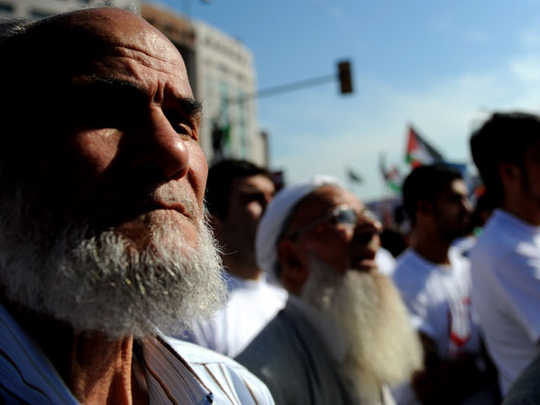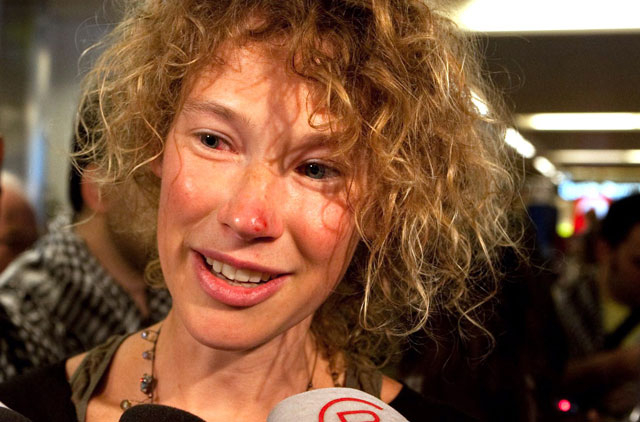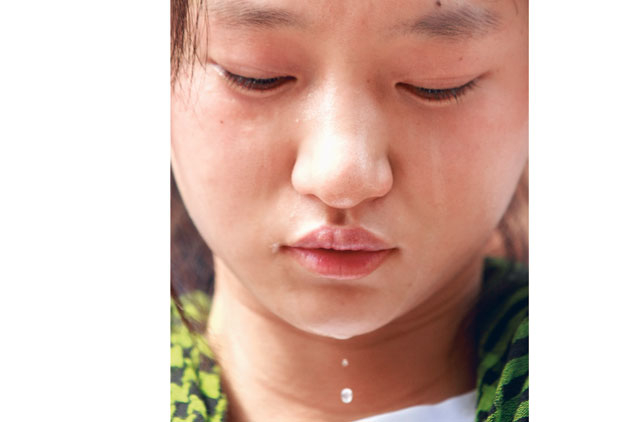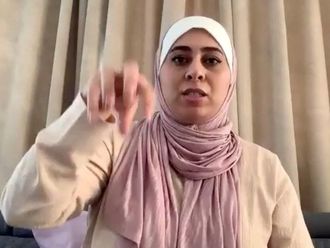
Muscat: Almost half of the 550 or so passengers were disembarked from the Mavi Marmara one-by-one in the tent that served as the Israeli interior ministry's office.
I was taken off the ship with two handlers holding me firmly on each side as my hands were cuffed. I was filmed and photographed as I entered. Upon entering the tent, I was greeted by interior ministry officials. It was quite a relief to see real human faces after the robotic masked army men that we had faced for hours on the ship.
"Good evening. Name?" I introduced myself, said where I was from and pointed out that I was a journalist. That led them into a discussion into whether my cuffs should be removed. I was seated on a chair as a few officials discussed my situation in Hebrew.
Read part 1 of the eyewitness account
Read part 2 of the eyewitness account
Read more stories on the Freedom Flotilla
One then looked at me and said, "Do you promise not to make trouble if we uncuff you?"
"I don't pose a threat to you," I said, reiterating that I was a journalist.
"Okay," he said, "We trust you."
I was searched down to my underwear for the second time that day, then taken for an official sitting at a computer. "Good evening sir, I am going to ask you a couple of questions," my interviewer said. I asked for a lawyer and was told there wasn't one available.
"Do you know that you have entered the state of Israel illegally?" he asked.
I almost let out a chuckle. "I'm not going to answer that."
"Do you know that the waters around Gaza are a closed military zone," he proceeded.
"I am not going to answer that," I said.
"Why were you on the boat," he asked.
"I am a journalist. I was doing my job," I said. He then asked a fourth question along the lines of whether I knew that it was illegal to enter Gaza, which I refused to answer too.
After the questions, he handed me a green piece of A4 paper and asked me to sign it. "Don't bother. I'm not signing that," I said.
"Fine. So you don't even want to read it?" he asked.
"Sure," I said. I looked over it and didn't understand half the legal jargon it contained, but understood that it was an admission of entering Israel illegally. Signing the paper would be a lie that would grant me instant freedom.
Common pledge
The man who claimed to want to help me said that most of the passengers had signed it. I did not believe him, of course, because we had reiterated time and again in the boat that no one would sign anything Israel gave them, considering that we had been brought to the country against our will from international waters.
But I had to be sure. "Can I consult with other flotilla members then?" I said, thinking of the Kuwaitis, who like me did not have the benefit of an embassy in Israel.
The request was refused and the official told me exactly what I had been thinking. "Look, it's fine if the others don't sign because they have embassies that will get them out. You don't."
"Then so be it. I am not signing a lie. My newspaper, too, has told me not to sign," I said.
Ten minutes later, the official came back telling me there is a piece of white paper that I could sign which would only indicate my willingness to leave the country within 72 hours and not admit to any crimes I had not committed. I agreed.
Chance to make a call
As I waited, the official offered me a phone call. I told him I needed to call my editor, who would confirm to my family that I was okay. I gave him the number, which he dialled to confirm who I was speaking to, then handed me the phone.
My editor, who had earlier told me not to sign anything that was given to me, now insisted that I sign it as a last resort, saying that it might be difficult to get me out otherwise. I still refused, hoping that the Israeli official sitting beside me, an Arabic speaker, could not hear the conversation. Before hanging up, I also gave my editor the final count of dead and injured, and told him to attribute it to an Israeli official, referring to the man sitting beside me, who had just told me.
Upon hanging up, I was overcome by a feeling of gloom, thinking efforts to free me from Muscat and Dubai were failing. But I had to keep reminding myself of our strength in numbers, and the possible international repercussions of Israel's killings on the boat to reassure myself.
The official said that signing the white paper meant I could be deported, but would have to spend that night in prison. It was midnight and I had not had much besides biscuits to eat for almost 24 hours. I asked if I could get some food, as promised earlier. "Sure," said one official, who got me a pastrami sandwich.
I was then searched down to my underwear for the third time that day and put on a cage-bus that took us to a prison a couple of hours away.
Prison routine
We reached the prison and were given the freedom to choose our cell and cellmates. Each one of us was given a yellow tray that had a towel, change of underwear, socks, tooth brush, tooth paste, a cup, and a plastic spoon.
Each one of us was then seen by a doctor and social worker, both polite, and the latter of whom told me I was in Eda prison in Beer Sheba, south of Tel Aviv.
I then decided to take a much-needed shower. The water was cold, and its pressure was so high that my jeans kept nearby got wet. Since the only change of clothes we got was underwear, I had to put back on my unwashed clothes and head to my cell.
Prisoners had to take their own pillows, bedsheets and blankets from a stack in the corner. By the time I went in, there was only a pillow left, which I had to make do with.
I went to sleep, appreciating the luxury of sleeping in a bed after a long time.
I woke up next morning dizzy, with a headache, hungry, and shivering uncontrollably. I kept telling myself that I could not let myself get sick. If I did, I'd be left all alone. I asked a jail guard if I could get food. "Later," he said.
"How about a doctor then," I asked.
"Yes, later," he said. I asked him the time and he said it was 10.30am. I went back to sleep to wake up at about 12.30, still shivering. My jeans were still wet.
I asked for a doctor and was taken to one. I was greeted in the clinic with a female doctor in her fifties who politely assured me that she was there to take care of me. She later concluded that all I needed was rest and food, and gave me some pills.
I was late for lunch, and was left with a few bland pieces of fish to eat. Those who asked for more were told there was none. My cellmates offered me their rice, but I waited till they were done to take their leftovers.
Diplomatic assistance
After lunch, the diplomats started streaming in, mostly from Western states. After being shut out from the outside world for two days, that was the first time we heard about the repercussions of Israel's killings on the Mavi Marmara. A Western diplomat told us the events had created "an earthquake" for Israel.
Then, a Jordanian diplomat arrived and told me I was among those that were going to leave for Jordan via the King Hussain bridge that evening. I was glad, but hesitated to tell my Scottish cellmate, who had just been told by his embassy representative that he could be in prison for up to a week.
Later that night, we were held in a bigger cell with others who were scheduled to leave to Amman. They cramped about 20 of us in and it was getting hot and smelly.
An approximately 50-year-old Malaysian aid worker asked the guards repeatedly to go to the washroom, and his request was refused. He eventually had to urinate in a bottle and leave it behind as a "gift" for the prison guards.
Drive to Jordan border
We were then moved to caged police cars that could fit up to six prisoners each, and were driven to the bridge that connects the West Bank to Jordan.
It was dark and there was little I could see from the window beyond the cage, but despite dozing off every few minutes I ensured that my eyes were kept open to look outside for the entire duration of the drive. I was looking for the smallest glimpse of occupied Jerusalem, to see what it was about the city that has changed hands so many times. We eventually reached the crossing close to dawn, and moved to a Jordanian bus that took us across the bridge.
I breathed a sigh of relief when we crossed into Jordanian territory, as the passengers on the bus broke into applause. Perhaps I'll have to wait till Jerusalem changes hands again, if it happens in my lifetime.
- This is the last in the series of eyewitness accounts.














